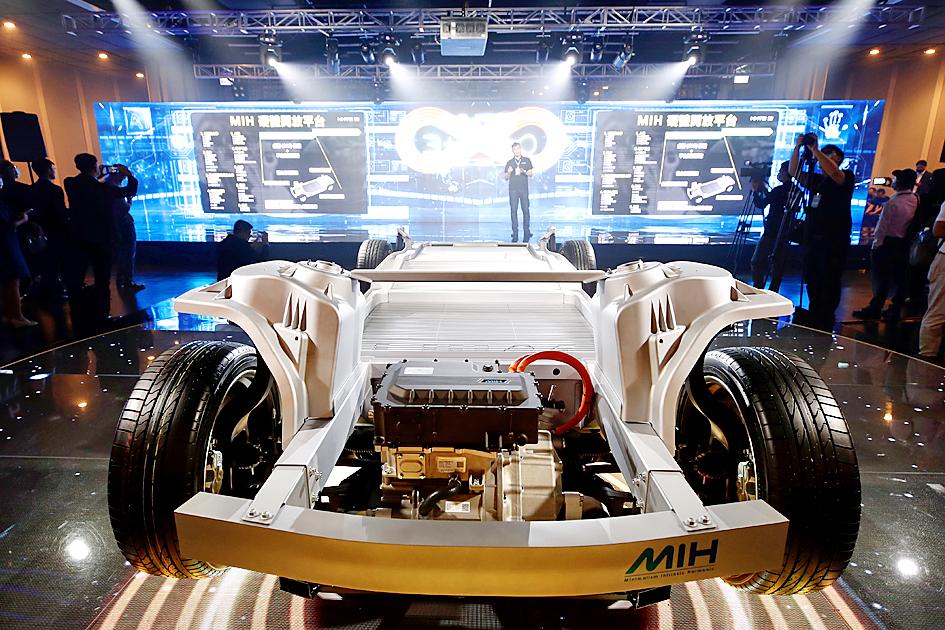India’s Tata Technologies Ltd has become the latest member of Hon Hai Precision Industry Co’s (鴻海精密) MIH Open Platform to jointly develop sustainable mobility solutions for customers worldwide, the Taiwanese company said yesterday.
It might include embedded and electrical, electric platform development and battery management system solutions, among others, Hon Hai said.
Tata Technologies’ participation marks more progress in Hon Hai’s efforts to expand its electric-vehicle (EV) ecosystem through the MIH platform, it said.

Photo: RITCHIE B. TONGO, EPA-EFE
The open platform has about 2,380 members around the world, with an aim to jointly develop EV ecosystems and shrink the time to market for products.
Hon Hai made the announcement on Facebook and posted photographs, with one showing MIH Consortium chief executive officer Jack Cheng (鄭顯聰) shaking hands with Tata Technologies CEO Warren Harris.
Hon Hai signed the contract with Tata Technologies to join the platform at the Indian company’s office in Detroit, Michigan.
Hon Hai said it is on track to ship its first microprocessors and other chips used in EVs by 2024.
The company would supply chips for its EV customers and for original electronic manufacturers, said Gene Liu (劉錦勳), vice president of Hon Hai’s SoC Design Center.
Liu declined to comment on the company’s progress in collaboration with Stellantis NV on new vehicle chips.
Hon Hai has set a three-year goal to boost its revenue from EVs and related components to NT$1 trillion (US$33.69 billion), and for EV shipments to reach 500,000 to 750,000 units a year in 2025.
The company this year is to make electric light-duty trucks for Lordstown Motors Corp, which is based in Ohio, and produce EVs for Fisker Inc in the fourth quarter next year.

Macronix International Co (旺宏), the world’s biggest NOR flash memory supplier, yesterday said it would spend NT$22 billion (US$699.1 million) on capacity expansion this year to increase its production of mid-to-low-density memory chips as the world’s major memorychip suppliers are phasing out the market. The company said its planned capital expenditures are about 11 times higher than the NT$1.8 billion it spent on new facilities and equipment last year. A majority of this year’s outlay would be allocated to step up capacity of multi-level cell (MLC) NAND flash memory chips, which are used in embedded multimedia cards (eMMC), a managed

In Italy’s storied gold-making hubs, jewelers are reworking their designs to trim gold content as they race to blunt the effect of record prices and appeal to shoppers watching their budgets. Gold prices hit a record high on Thursday, surging near US$5,600 an ounce, more than double a year ago as geopolitical concerns and jitters over trade pushed investors toward the safe-haven asset. The rally is putting undue pressure on small artisans as they face mounting demands from customers, including international brands, to produce cheaper items, from signature pieces to wedding rings, according to interviews with four independent jewelers in Italy’s main

CULPRITS: Factors that affected the slip included falling global crude oil prices, wait-and-see consumer attitudes due to US tariffs and a different Lunar New Year holiday schedule Taiwan’s retail sales ended a nine-year growth streak last year, slipping 0.2 percent from a year earlier as uncertainty over US tariff policies affected demand for durable goods, data released on Friday by the Ministry of Economic Affairs showed. Last year’s retail sales totaled NT$4.84 trillion (US$153.27 billion), down about NT$9.5 billion, or 0.2 percent, from 2024. Despite the decline, the figure was still the second-highest annual sales total on record. Ministry statistics department deputy head Chen Yu-fang (陳玉芳) said sales of cars, motorcycles and related products, which accounted for 17.4 percent of total retail rales last year, fell NT$68.1 billion, or

In the wake of strong global demand for AI applications, Taiwan’s export-oriented economy accelerated with the composite index of economic indicators flashing the first “red” light in December for one year, indicating the economy is in booming mode, the National Development Council (NDC) said yesterday. Moreover, the index of leading indicators, which gauges the potential state of the economy over the next six months, also moved higher in December amid growing optimism over the outlook, the NDC said. In December, the index of economic indicators rose one point from a month earlier to 38, at the lower end of the “red” light.